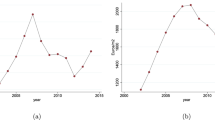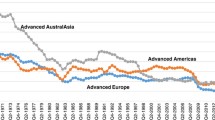Abstract
We examine how shocks emanating from changes in the stock wealth affect the consumption demand in India using a Bayesian VAR framework. The effect of the stock market wealth shock on consumption demand in India is relatively small in magnitude. The estimates suggest that a 10% increase in the real stock wealth raises the consumption demand by 0.3%, which seems to be consistent with some empirical estimates for the emerging market economies given a relatively low share of stock wealth in the household asset portfolio and its asymmetric distribution. The stock market wealth effect being short run in nature does not have a large and persistent effect on consumption demand since consumers may not perceive the changes in the stock wealth to cause a permanent shift in their wealth.
Similar content being viewed by others
References
Ando A, Modigliani F (1963) The life cycle hypothesis of saving: aggregate implications and tests. Am Econ Rev 53: 55–84
Bosworth B (1975) The stock market and the economy. Brookings Papers on Economic Activity 2: 257–300
Christoffersen P, Sløk T (2000) Do asset prices in transition countries contain information about future economic activity? IMF Working Paper WP/00/103
Davis MA, Palumbo MG (2001) A primer on the economics and time series econometrics of wealth effects. Finance and Economics Discussion Paper, Federal Reserve Board, Washington
Deaton A (1992) Understanding consumption. Oxford University Press, Oxford
Friedman M (1957) A theory of the consumption function. Princeton University Press, Princeton
Funke N (2004) Is there a stock market wealth effect in emerging markets?. Econ Lett 83: 417–421
Gale WG, Sabelhaus J (1999) Perspectives on the household savings rate. Brookings Papers on Economic Activity 1: 1181–1224
Grant C, Peltonen T (2005) Housing and equity wealth effects of Italian households. DNB Working Paper No. 43
Gramlich EM (2002) Consumption and the wealth effect: the United States and the United Kingdom. Remarks before the International Bond Congress, London, Feb 20, 2002
Hall RE (1978) Stochastic implications of the life cycle-permanent income hypothesis: theory and evidence. J Political Econ 86: 971–987
Hall R (1988) Intertemporal substitution in consumption. J Political Econ 96: 339–357
International Monetary Fund: (2002) Three essays on how financial markets affect real activity. World Economic Outlook, Washington DC
Kiley MT (2000) Identifying the effect of stock market wealth on consumption: pitfalls and new evidence. Federal Reserve Board, Mimeo
Lehnert A (2004) Housing, consumption, and credit constraints. Federal Reserve Board Working Paper No. 2004-63
Ludvigson S, Steindel C (1999) How important is the stock market effect on consumption. Federal Reserve Bank New York Economic Policy Review 5: 29–51
Ludwig A, Sløk T (2002) The impact of changes in stock prices and house prices on consumption in OECD countries. IMF Working Paper WP/02/1, January
Ludwig A, Sløk T (2004) The relationship between stock prices, house prices and consumption in OECD countries. Top Macroecon 4(1)
Maki DM, Palumbo MG (2001) Disentangling the wealth effect: a cohort analysis of household saving in the 1990s. Finance and Economics Discussion Series 2001-21, Board of Governors of the Federal Reserve System, Washington DC
Mishkin FS (2007) Housing and the monetary transmission mechanism, Finance and Economics Discussion Series 2007-40. Board of Governors of the Federal Reserve System, Washington DC
Mishkin FS, White EN (2002) US stock market crashes and their aftermath: implications for monetary policy. Asset Price Bubbles Conference, Federal Reserve Bank of Chicago and The World Bank, Chicago, 23 April 2002
Poterba JM (2000) Stock market wealth and consumption. J Econ Perspect 13: 91–118
Romer CD (1990) The great crash and the onset of the great depression. Q J Econ 105: 597–624
Slacalek J (2006) What drives personal consumption? the role of housing and financial wealth. DIW Berlin Discussion Paper 647
Starr-McCluer M (1998) Stock market wealth and consumer spending, Finance and Economics Discussion Series 1998-20. Board of Governors of the Federal Reserve System, Washington DC
Author information
Authors and Affiliations
Corresponding author
Additional information
The views expressed in the paper are those of the author and do not represent the views of the Reserve Bank of India.
Rights and permissions
About this article
Cite this article
Singh, B. How important is the stock market wealth effect on consumption in India?. Empir Econ 42, 915–927 (2012). https://doi.org/10.1007/s00181-010-0444-x
Received:
Accepted:
Published:
Issue Date:
DOI: https://doi.org/10.1007/s00181-010-0444-x




